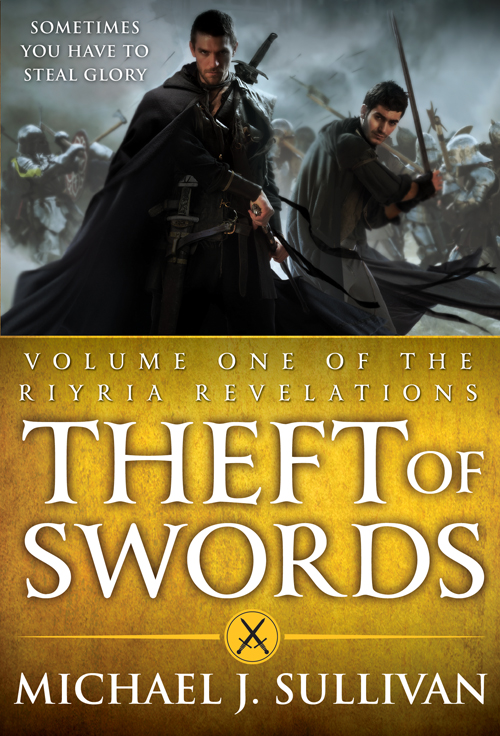Science fiction and fantasy author Michael J. Sullivan is one of the great success stories of self-publishing. Each of the books in his Riyria Revelations series has garnered a four-star rating (or better) on Goodreads and many positive reviews from readers and critics. Sarah Chorn, AKA Bookworm Blues says the first novel “nicely blends well-known fantasy tropes and new ideas to create something unique, yet comforting. This was a good action-adventure romp filled with interesting situations which reminded me of Dungeons and Dragons (only better) with the maturity an adult would enjoy.” Iceberg Ink says the second novel “is a more-than-worthy follow-up and an opening to a wider world of Elan, one in which I hope to spend many more hours enjoying.” And King of the Nerds praises the third book, which “has raised the bar once again for future installments in the series. Sullivan effortlessly blends an old school fantasy feel with a reinvigorating verve.”
Orbit Books subsequently offered Sullivan a deal to republish the Riyria Revelations in omnibus volumes, giving the author something he didn’t have before: a physical shelf presence. Sullivan may not have been the first self-published author to be snagged and republished by one of the (at the time) Big 6 publishers, but he was certainly one of the more notable in the field of recent fantasy and science fiction to get such a deal. Orbit knew what they were doing (as informed by the many readers Sullivan accrued before having the physical shelf presence) because the books continued to sell after being collected, increasing Sullivan’s audience.
Each omnibus collects two Riyria novels, and the first two, Theft of Swords and Rise of Empire, contain stories that were previously self-published. However, the third volume, Heir of Novron, is split between a previously self-published work and a brand new conclusion to the series titled Percepliquis. Sullivan didn’t want to put-off his long-time readers too much by demanding that they re-purchase book five, so Orbit allowed a compromise of sorts for this final novel, but more on that later.
The series tells the tale of two friends and brothers in arms: Royce Melborn, a thief, and Hadrian Blackwater, a mercenary. The two call themselves Riyria and are known as a competent duo, working outside the thieves’ guild and taking on jobs for nobles who would otherwise not want to get their hands dirty. Off the bat, Sullivan gives readers fully-formed protagonists who are mature rather than the clichéd farmboys of epic fantasy. In fact, the feel of the story at the outset has more of a sword and sorcery adventure than epic fantasy. Of course, the comparison many people have made to Royce and Hadrian is to Fritz Leiber’s Fafhrd and the Grey Mouser. The relationship between Royce and Hadrian comes across as something that is long-standing.
In The Crown Conspiracy (the first novel) Hadrian and Royce are hired to steal a sword in order for a noble to win a duel, since his opponent cannot be beaten whilst wielding the sword in question. Turns out this is a set-up and the duo are framed for regicide, but they are rescued by Princess Arista (daughter of the murdered king). She then helps them plan the abduction of her brother, Alric, in order to protect him from assassination plots. All told, The Crown Conspiracy is a fun, caper-like adventure.
In the second novel, Avempartha, our protagonist duo is hired by a young woman to save her village from a rampaging monster that has already killed most of her family. Here, another straightforward plot—kill the monster—is a façade for the more layered plot Sullivan reveals throughout the novel. In its early chapters, Avempartha reminded me of Barbara Hambly’s Dragonsbane. But while Royce and Hadrian investigate the monster in the village of Dahlgren, they run afoul of the Church of Nyphron—which isn’t exactly a happy-go-lucky and charitable organization. The Church’s supposed “search” for the true Heir of Novron is merely a bid for power in establishing the New Empire, so more than the fate of the village is at stake.
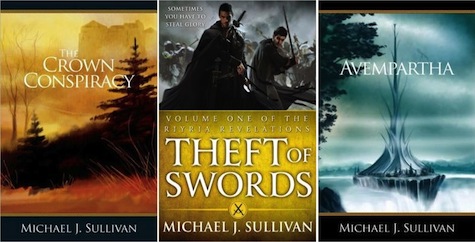
In Nyphron Rising, the Empire begins creating a foothold in the world at large, absorbing smaller nation-states into its thrall. Thrace, the young woman from the previous book, has been named the Heir of Novron and is rechristened as the Empress Modina. But Modina is a puppet, existing in a state of almost zombie-like shock. Sullivan reveals more about Royce and Hadrian in this third novel and brings the princess Arista more into the spotlight. In short, Sullivan is beginning to expand his series from intimate character sword & sorcery to larger scale stories, and I found Sullivan’s mix of traditional ingredients of epic fantasy with compelling storytelling to be very appealing.
The fourth book, The Emerald Storm, takes its title from the ship on which Royce and Hadrian find themselves for much of the novel. Sullivan splits the screen time between the adventure at sea with the continuing development of the bond between Modina and her assistant Amilia, Modina’s emergence from her shell, and Amilia’s growing respectability in the court. Arista arrives with news that the true heir, Degan Gaunt, survives somewhere.
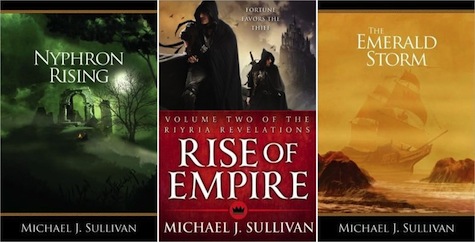
As Wintertide begins, princess Arista is imprisoned, our heroes Royce and Hadrian are separated from each other, and the manipulator Saldur (who placed Modina on the throne as a puppet) is about to take the reins of the burgeoning empire fully within his grasp. Amilia was hand-picked by Saldur to prepare the listless Empress to do his bidding, but he did not anticipate their friendship and growing strength. Compounding his difficulties is the impending invasion of the Elves, who after years of seclusion wish to return and claim the Empire as their own.
With the Riyria duo separated, Sullivan focuses on the differences between the two characters to show how the opposites (Royce a cynic and Hadrian an optimist) have balanced each other so well. Wintertide provides a more personal scope compared to the previous novels, which sets Royce and Hadrian’s penultimate character arcs in motion—redemption may be possible for both heroes, and they may be able to save the Empire from Saldur’s clutches.
But first, in order to quell the Elves’ invasion a great horn must be found in the near mythical city of Percepliquis, the once grand utopic city of the Ancient Empire. Percepliquis is, of course, the title of the final installment of this series, and Sullivan returns to more of a quest story to bring the saga to its full and logical conclusion. Essentially, a large portion of Percepliquis is a dungeon crawl which follows the brief voyage to the ancient city. Royce has lost all hope after the disastrous events in Wintertide, Hadrian is pushing to see that hope is renewed and that Saldur can be expelled from his seat of power.
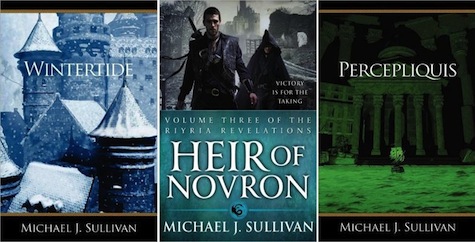
One thing that Sullivan has played with throughout the series is the idea of Prophecy. In this respect, he’s treading ground (successfully, for my mileage) that Tad Williams treads in his Memory, Sorrow and Thorn series. Like Williams, Sullivan is splaying with readers expectations of how to use Prophecy and characters expectations on how to read certain prophecies. In other words, just because the Prophecy is written and “known” doesn’t mean that you really know its true meaning.
Back to what I intimated regarding Percepliquis… Sullivan is many would now term a hybrid author, meaning that he’s got feet in multiple publishing realms. Since he gained many readers prior to the Orbit deal, he wanted to ensure those readers could get the final volume of the series in their chosen format (ebook of only Percepliquis or a paperback matching in style and size to the previous five volumes) and not have to get the omnibus containing Percepliquis if they already owned a version of Wintertide. When I interviewed Michael for SFFWorld in 2011, he said Orbit was very willing to work with him:
From a business perspective they have gone the extra mile on every occasion […] especially with regards to accommodating the existing fans. Orbit is putting out a Percepliquis only version as an eBook, so that people can complete their sets (with my art on the cover [Ed. Michael created the covers for all the individual novels in the series]) and a print/POD version I’ll be printing/selling. And ebook buyers don’t have to re-buy Wintertide as part of the Omnibus version. […] This means fans can still have books signed as they have in the past. None of this is standard so it makes things more challenging for Orbit and yet they still step up to the plate. This is just further proof that they were indeed the right choice.
While all that is great, I think the most impressive thing so far has been from the marketing department. I had read articles and heard stories from other authors saying that publishers don’t do much in regards to marketing these days. That has definitely not been my experience with Orbit. It would take several volumes for me to detail all the things they have done, are doing, or plan to do. They have some really talented, savvy, dedicated people. I love seeing them share in our successes
I think that sums up very well that Orbit is a publisher who cares about its authors and its readers. And Sullivan himself is giving back in many ways, not the least of which is raising money to help fight cancer through a charity bike ride in addition to being open to the community readers and burgeoning writers.
As a result of the success of this series, Sullivan has published two additional novels set in the Riyria world through Orbit: The Crown Tower and The Rose and the Thorn. Because Orbit took a chance on Sullivan in late 2011, we are seeing more authors make the transition from self-publishing to (some sort of) traditional publishing, including David Dalglish (also with Orbit) and Anthony Ryan (Ace in the US, Orbit in the UK).
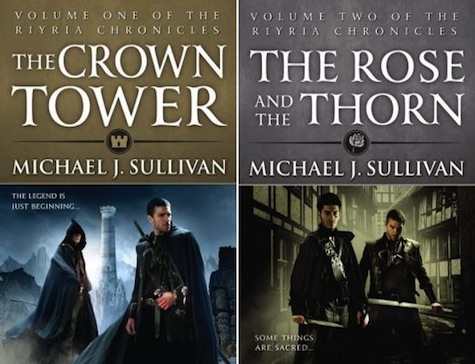
To bring things back to the books, with the six books of The Riyria Revelations Michael J. Sullivan has told a fun, entertaining story. I’d recommend these books to readers who enjoyed Fritz Leiber’s Fafhrd and the Gray Mouser tales, James Barclay’s Raven, Tad Williams’ Memory, Sorrow and Thorn (mainly for the tinkering with prophecy), as well as Raymond Feist’s original Magician or the Empire Trilogy he wrote with Janny Wurts, or Brent Weeks’s Night Angel Trilogy and R.A. Salvatore’s Icewind Dale Trilogy and Dark Elf Trilogy.
Michael has samples to all of his work on his blog.
Rob Bedford lives in NJ with his wife and dog. He reviews books and moderates forums at SFFWorld, has a blog about stuff, and writes “The Completist” column for SF Signal. If you want to read random thoughts about SFF geekery, TV, his dog, and beer you can follow him on Twitter: @RobHBedford.










